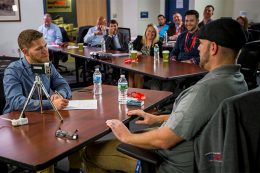Excerpt
It would have seemed odd to outsiders.
Men and women of all ages sat in a nondescript conference room, watching intently as two men talked to each other as if no one else was there. The video camera between them yielded the only clue: This was an interview – not for a job, but for something even more important.
“It brought me to tears, and if anybody knows me, I don’t actually do that,” said veteran David Morse, a student at Wright State University in Dayton, Ohio. Morse was describing a wrist injury he suffered while in the service, sharing his story as part of the university’s Veterans’ Voices project. The project is recording hundreds of stories from veterans and archiving them in the Library of Congress for future generations.
Veterans from Raytheon volunteered at this special session of the project to learn its story-sharing so they can use it as a mentoring tool inside the company’s veteran-rich culture. More than 10,000 veterans work at Raytheon.Through a variety of programs, including partnerships with organizations like Student Veterans of America and Boys and Girls Clubs of America, the work of the employee resource group RayVets, which promotes the interests of the company’s veterans, and many other efforts, the company has embraced the mission of supporting military families and veterans.

David Berry and David Morse, two student veterans at Wright State University, demonstrate the art of interviewing a veteran for Raytheon volunteers as part of the Veterans’ Voices project. (Photo courtesy Raytheon)
Following the demonstration interview, student veteran Jeremy Dobbins began a training session on the art of interviewing veterans and drawing out their stories. “No one really knows what is going to be relevant to a younger generation,” he said.
After the training session, the Raytheon volunteers divided in pairs and recorded their own interviews, which proved to be a powerful experience.
“We do share a bond,” said Glen Dare, Vice President of Global Operations for RayVets. “We were both in the military. The story I shared isn’t one I’d just tell anyone.”
Based on his experience, Dare believes the project will encourage even more veteran-to-veteran mentoring inside Raytheon.
“Raytheon gives veterans the opportunity to continue their mission,” said Dare. “When they get out of the military, they sometimes feel there is no place for them to go. We hope to show them they can use those skills, especially in an organization like Raytheon. We help them transition as they go from military to civilian culture and help them have a soft landing, where someone can guide them through the process of becoming a civilian.”
View the original post at raytheon.com

 Wright State joins selective U.S. Space Command Academic Engagement Enterprise
Wright State joins selective U.S. Space Command Academic Engagement Enterprise  Glowing grad
Glowing grad  Wright State’s Homecoming Week features block party-inspired events Feb. 4–7 on the Dayton Campus
Wright State’s Homecoming Week features block party-inspired events Feb. 4–7 on the Dayton Campus  Wright State music professor honored with Ohio’s top music education service award
Wright State music professor honored with Ohio’s top music education service award  Wright State’s Industrial and Human Factors Engineering program named one of top online graduate programs by U.S. News
Wright State’s Industrial and Human Factors Engineering program named one of top online graduate programs by U.S. News 